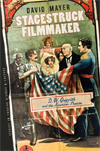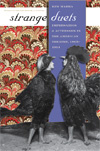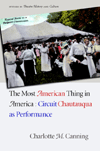An actor, a vaudevillian, and a dramatist before he became a filmmaker, D. W. Griffith used the resources of theatre to great purpose and to great ends. In pioneering the quintessentially modern medium of film from the 1890s to the 1930s, he drew from older, more broadly appealing stage forms of melodrama, comedy, vaudeville, and variety. In Stagestruck Filmmaker, David Mayer brings Griffith’s process vividly to life, offering detailed and valuable insights into the racial, ethnic, class, and gender issues of these transitional decades.
Combining the raw materials of theatre, circus, minstrelsy, and dance with the newer visual codes of motion pictures, Griffith became the first acknowledged artist of American film. Birth of a Nation in particular demonstrates the degree to which he was influenced by the racist justifications and distorting interpretations of the Civil War and the Reconstruction era. Moving through the major phases of Griffith’s career in chapters organized around key films or groups of films, Mayer provides a mesmerizing account of the American stage and cinema in the final years of the nineteenth century and the first three decades of the twentieth century.
Griffith’s relationship to the theatre was intricate, complex, and enduring. Long recognized as the dominant creative figure of American motion pictures, throughout twenty-six years of making more than five hundred films he pillaged, adapted, reshaped, revitalized, preserved, and extolled. By historicizing his representations of race, ethnicity, and otherness, Mayer places Griffith within an overall template of American life in the years when film rivaled and then surpassed the theatre in popularity.
“David Mayer combines groundbreaking archival work with first-rate cultural history to establish the lineage between theatre and early film. Mayer’s clear and nuanced reading challenges current views of melodrama, early film acting, and verisimilitude in art, indeed the very relationship between stage and screen in D. W. Griffith’s America.”—Rosemarie K. Bank, Kent State University
“This fascinating study makes a compelling case for how intricately D. W. Griffith’s historic film career was embedded in and influenced by the American theatre. Among the book’s strengths are Mayer’s impressive depth of knowledge of both the theatrical and cinematic industries, his command of the larger social history surrounding these industries, his engaging writing style, and his eye for intriguing examples of stage influences that illuminate some of Griffith’s lesser-known as well as more famous works. A significant work of American cultural history.”—Kim Marra, author, Strange Duets: Impresarios and Actresses in the American Theatre, 1865–1914
Acknowledgments ix
Introduction 1
1 The Mobile Theatre 31
2 Actor and Playwright 57
3 Griffith at Biograph 87
4 Dramas of Civil War, Ethnicity, and Race 120
5 The Clansman and The Birth of a Nation 142
6 Eclecticism and Exploration 166
7 Way Down East 186
8 Twilight Revels 217
Notes 251
Playlist 273
Filmography 277
Bibliography 281
Index 295


